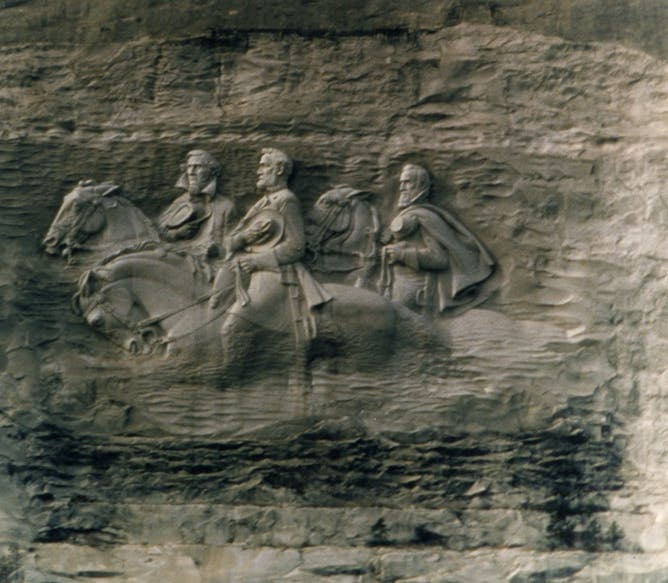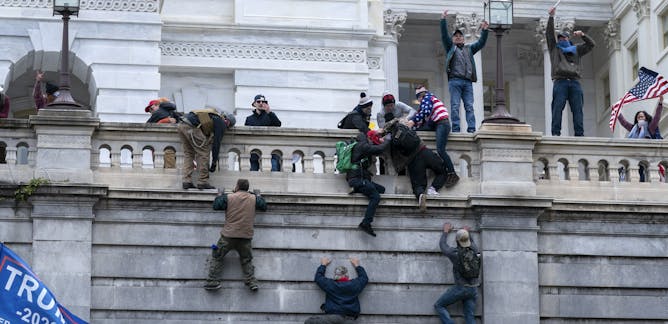|
|
|
|
American politics move fast, but we on the Politics + Society desk keep a close eye on the deeper, systemic issues behind the headlines. So when I came across a scholarly paper about how the Republican Party’s devotion to Donald Trump endangers democracy, I got in touch with its authors.
Those authors − Erica Frantz, a political science scholar at Michigan State University; Joseph Wright, who studies political science at Penn State; and Andrea Kendall-Taylor, who holds, among other posts, a position as distinguished practitioner in grand strategy at Yale − translated their scholarly article into a piece for regular readers.
In it, they describe how democracy can be subverted into giving birth to authoritarianism. It has to do with political party insiders being purged or converted into supporters not of ideals or policies but of a particular person. It has happened around the world, and it’s happening here, too. In 2020, for instance, the Republican Party adopted no new platform, agreeing instead to support whatever Trump did or said.
The cause of this problem, Frantz, Wright and Kendall-Taylor explain, is not so much with the person at the top but rather with all those in the lower ranks who go along or allow themselves to be pushed out of the way. These scholars describe a process, already underway in the U.S., that provides a warning not about politics but about democracy.
|

|
Jeff Inglis
Politics + Society Editor
|
|

Republican elites have embraced Trump as their leader.
AP Photo/Alex Brandon
Erica Frantz, Michigan State University; Andrea Kendall-Taylor, Yale University; Joseph Wright, Penn State
A second Trump presidency may be a danger to democracy, but that’s more to do with the Republican Party than Trump himself, researchers of authoritarianism explain.
|

Confederate leaders Robert E Lee, Stonewall Jackson and Jefferson Davis are depicted in this carving on Stone Mountain, Ga.
MPI/Getty Images
Donovan Schaefer, University of Pennsylvania
At the turn of the 20th century, Southern sympathizers started building monuments to Confederate leaders. Black newspaper editors saw these emblems clearly for what they stood for – a lost cause.
|

On Dec. 8, 2023, Prime Minister Benjamin Netanyahu attends the funeral of a 25-year-old Israeli soldier who was killed in Gaza.
Alexi J. Rosenfeld/Getty Images
Dov Waxman, University of California, Los Angeles
A scholar of Israeli politics explains why Israelis are increasingly turning against Netanyahu and his promise that Israel can quickly defeat Hamas and bring Israeli hostages home.
|
|
|

Wayne Unger, Quinnipiac University
In their Supreme Court brief, Colorado residents seeking to bar Trump from their state’s ballot say that ‘Trump intentionally organized and incited a violent mob to attack the US Capitol.’
| |

Mark A. Graber, University of Maryland
US law has long held that those who support rebels and insurrectionists are just as guilty of treason as those who support foreign enemies.
|

Michael K. Logan, Kennesaw State University; Jennifer Carson, University of Central Missouri
The death of a protester in 2023 at the site of the proposed Atlanta Public Safety Training Center has brought renewed attention to radical environmentalism in the United States.
| |

Derek H. Kiernan-Johnson, University of Colorado Boulder
Lawyers submitting briefs to the Supreme Court in the Trump Colorado ballot case must file a ‘certificate of word count.’ Why? As one judge put it, lawyers’ briefs are ‘too long, too long, too long.’
|
|
|
|
|
-
Justin de Benedictis-Kessner, Harvard Kennedy School
As in the federal and state governments, local elected officials are more likely to be white than their constituents. At times, such as with school boards, the differences are particularly stark.
-
Thomas Doherty, Brandeis University
On the 100th anniversary of Woodrow Wilson’s death, a presidential historian looks at how he was able to stay in power despite his illnesses.
-
Charmaine Willis, Skidmore College; Keith A. Preble, Miami University
Economic proscriptions by the US and EU are hampered by lack of support among Myanmar’s major trading partners in the region.
-
Phillip McGarry, University of Tennessee
With growing polarization, political attitudes have begun to coincide with moral convictions. Partisans increasingly view each other as immoral. New research reveals the depth of that conviction.
|
|
|
|
|
Like this newsletter? You might be interested in our other weekly emails:
|
| |
| |
| |
| |
|
|
|
|
|
|
|